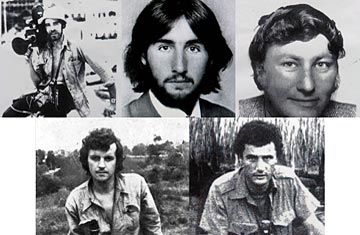
The five Australian journalists known as the Balibo Five, clockwise from top left: Brian Peters, Tony Stewart, Gary Cunningham, Greg Shackleton and Malcolm Rennie
The five enthusiastic young journalists never got their world exclusive out — but their story still resonates more than three decades later. In 1975, Australian reporters Greg Shackleton and Tony Stewart, Britons Brian Peters and Malcolm Rennie and New Zealander Gary Cunningham were reporting from East Timor on what turned out to be an Indonesian invasion. The five were killed in a remote village. Colleagues and family members have always maintained that they were killed by Indonesian soldiers, a claim Indonesia denies. In the eyes of some Australians, their deaths are an indelible reminder of the brutality of the Indonesian military and the mendacity of their own government in failing to prevent the killings and condemn the invasion.
Now, though, the reporters' ghosts have risen again to haunt the governments of both Indonesia and Australia. On Sept. 9, Australia's Federal Police announced a war-crimes investigation into their deaths. Says Gary Cunningham's brother Greig: "We don't believe in the death penalty, but we want to see the people responsible face justice. They should be prosecuted on the evidence we now know."
The five journalists were attempting to film Indonesian troops as they crossed into East Timor and attacked the tiny village of Balibo on a road about six miles (10 km) from the Indonesian border. The men, who were working for Australian television networks, believed the attacking Indonesian soldiers would treat them as noncombatants because of their status as international journalists. But shortly after the assault, their bodies were found in a house in the village. Indonesian military authorities said the five were caught in cross fire. Some Indonesian accounts even included extraordinary claims that some of the men had been wearing military-style uniforms and assisting the defending forces.
Australian authorities had been told of the invasion in advance but denied there was anything they could have done to assist the journalists or prevent the Indonesians from killing them. But in 2007, after a relentless campaign by the victims' families and a series of limited investigations and inquiries, a coroner's inquest was finally held into the death of Peters. Sydney magistrate Dorelle Pinch heard evidence from numerous witnesses who had been in Balibo at the time and from Gough Whitlam, who was the Australian Prime Minister in 1975. Timorese witnesses testified that they had seen the men deliberately shot as they hid in a house in the village. One of them was stabbed after he was forced out of a room where he had been hiding. Their bodies were later "burned to a crisp." Pinch found that Peters died from "wounds sustained when he was shot and/or stabbed deliberately and not in the heat of battle by members of the Indonesian special forces."
The coroner also nominated suspects who she believed had been responsible for the killings. Almost two years later the Federal Police are moving on her findings. There has been no explanation for the timing of the investigation announcement, but relatives including Greig Cunningham believe it could have something to do with a sudden burst of publicity about the case thanks to the release of the Australian-produced film Balibo, which recounts the incident. Based on the book Cover-Up by veteran journalist Jill Jolliffe, who has spent years reporting on East Timor, and featuring actor Anthony LaPaglia, the film presents a brutally frank depiction of the fate of the journalists. Says Cunningham: "Without being cynical, I think it's a nice coincidence that the movie has just come out. There's been an incredible response to the movie. It's shockingly confronting. I have people who have seen the movie coming out of it feeling so angry."
Cunningham remains furious with the Australian and New Zealand governments. "They left us believing they were missing for days and days. It's been a continuous series of lies, and other inquiries were not given access to certain information," he says. And he's still not confident the latest inquiry will result in convictions. "We don't know if the suspects will ever be extradited, but a solution might be that they have international arrest warrants so they can't travel around the world, which they do with impunity," he says.
Indonesian authorities are less than impressed with the announcement. President Susilo Bambang Yudhoyono told reporters that the move was a "backward-looking mind-set" that he hopes will not disturb Indonesia's relationship with Australia. But Cunningham and the other relatives are unlikely to give up their campaign for justice. "My brother was murdered, and his murderers are still alive," he says. "And while they're still alive, our fight for justice will keep going until it's passed on to the next generation."
